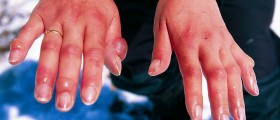
Radiation poisoning can be defined as damage to organ tissue that occurs due to excessive exposure to ionizing radiation. Even though the very term generally refers to acute radiation poisoning (acute exposure to a large dose of radiation) people may also develop radiation poisoning due to long-term exposure to small doses of radiation. The exposure to increased amount of radiation affects many cells and interferes in the process of their division.
Radiation poisoning may occur in case of exposure to external radiation sources or due to entrance of radioactive substances in the body.
What are Sources of Radiation Poisoning?
One of the most significant sources of radiation poisoning is nuclear welfare. For example heat radiation from nuclear war leads to thermal burns. Furthermore, the fallout from a nuclear explosion is responsible for beta burns and gamma rays that are also produced during a nuclear explosion are an excellent source of gamma radiation. Gamma radiation is responsible for most detrimental effects in human body.
Another source of radiation poisoning are nuclear reactors. Accidents that may occur in nuclear reactors as well as accidental exposure to radioactive material represent common causes of radiation poisoning. One more cause of radiation poisoning is improper handling as well as inadequate disposal of radioactive material. Clinical Characteristics of Radiation Poisoning
The exposure to radiation may lead to many damaging effects on the body. For example, there is decrease in number of red and/or white blood cells. Furthermore, radiation poisoning is responsible for sterility in both genders. Acute poisoning causes headache, nausea and vomiting, uncontrollable bleeding and destruction of bone marrow cells. In case of exposure to high doses of radiation lethal outcome is inevitable.
The symptoms and signs may vary a lot. This generally depends on the source of radiation, the amount and intensity of radiation.
Protection against Radiation Poisoning
Unfortunately, there is no cure for radiation poisoning. However, with proper protection one may avoid exposure to radiation and successfully prevent radiation poisoning.
The longer the person is exposed to radiation the higher is the the risk for radiation poisoning. This is why it is essential to decrease the time gap of exposure to radiation. For example, long exposure to X-rays increases risk of cancer. Hence all people who are exposed to X-rays must reduce time gap and prevent potential complications.
One more highly effective way of protection is to increase the distance between a person and a source of radiation. This is not a perfect method for gamma rays since they may travel large distances. However, in other types of radiation the energy of the source can significantly decrease if one is away from the source of radiation.
And finally, shielding is essential against radiation poisoning while manipulating and during exposure to radiation. Namely, if the shield around the source is better the chance of radiation poisoning significantly reduces.

















Your thoughts on this
Loading...